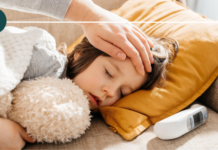Last month, our readers had an opportunity to submit questions about COVID-19 vaccines for children. We took those questions to our local experts at UnityPoint Health – Meriter and and had the chance to connect with Rachel Kelly, PA in Pediatrics at UnityPoint Health – Meriter. She sat down with us to talk through some of the frequently asked questions about the COVID-19 vaccine for children.
We know the information provided will be helpful to families as they choose the best health care options for their own family. We appreciate the time that Rachel Kelly took to address these questions. If you still have questions about vaccines – we encourage you to reach out to your trusted health care provider.
Watch the video in full here:
I have heard a number of people say that they think the vaccine will affect girls’ fertility as a reason not to get their daughters vaccinated. Is there any truth to this?
Rachel Kelly, PA: I know there’s been a ton of information going around and claims about the COVID vaccine potentially impacting fertility or impacting pregnancy. But we know based on the ingredients that are in the COVID vaccine, and the fact that the ingredients leave the body within a few days after vaccination, that this chance of an impact on fertility is really low. Additionally, there are a lot of monitoring systems in place to watch for any sort of complications like this following a new vaccine. And we haven’t seen any correlation between fertility problems or pregnancy problems following COVID vaccination.
What are the short and long term possible side effects of the COVID vaccine? And how can you be absolutely certain that these vaccines are safe for children when we have such limited data on long term effects?
Rachel Kelly, PA: That’s a great question and one that I think I hear most commonly cited as concern for parents getting their child the COVID vaccination. So the short term side effects are pretty simple to address. It’s basically the same list of potential side effects that we see with adults getting the vaccine as well. Most commonly, we definitely can see the sore arm following vaccine just like with any other vaccination. But then it’s also possible for children and adolescents to have a low grade fever, headache, body aches, some fatigue for a few days following vaccination, I’d say the vast majority, especially the younger population don’t really have many side effects following the vaccine, which is nice.
I do want to speak to the risk for myocarditis as well following vaccine because I think that’s probably been the most serious thing reported that parents can be concerned about. We have seen a correlation of myocarditis cases following vaccination within a week or so. However, this is limited to the young male population, and is also still found to be really, really rare. And I really like to talk about that we know there’s a risk for myocarditis after COVID infection, and it’s much higher risk with infection than with the vaccinations. So in reality, having that protection from the vaccine can help reduce risk for myocarditis following infection. So that’s a big point, I always like to make as well.
Longer term, we really don’t anticipate any sort of effect, again, based on the ingredients that are in our vaccinations. And as well as kind of comparing them to previous vaccines that have been out for years that we know don’t cause any long term effects for patients.
Is there any difference in the ingredients or dosing of the COVID vaccines for younger children, older children or adults?
Rachel Kelly, PA: All patients who are under 18 are only approved to get the Pfizer branded vaccination. And there is a difference between the 5 to 11 age range and the 12 and older (which is lumped in with adults). The ingredients are similar between the two different age vaccinations, but the 5 through 11 age range gets a smaller dose of vaccine. And the reason is that studies showed that a smaller dose for that younger population limited the chance of side effects and still was shown to be effective for preventing infection. And in preventing severe infection as well.
Knowing that there’s generally an uptick in cases at the start of the school year, should parents consider timing vaccines or boosters to be done in late summer to ensure that they have the best protection or that their protection is not waning at the start of school?
Rachel Kelly, PA: That’s a really great question. So right now, we actually encourage families to follow the dosing timeline that’s put out by the CDC and also approved by the American Academy of Pediatrics. With the reasoning just being that we know the doses are going to be most effective at those intervals. And then we also can’t predict if we’re going to see a potential variant pop up over the summer, we have no idea if there’s going to be something that pops up that’s more contagious or more severe.
So right now, I’d encourage families to follow the current timeline recommended by CDC, just so we can ensure that our population is the most protected in this moment. We don’t know if boosters might be recommended down the line closer to when school starts, or in the middle of the school year. So really just sticking to getting those doses when they’re due is the best advice.
Does my child need a booster shot? And you kind of answered that already, but would you like to expand a little bit more?
Rachel Kelly, PA: We know that booster doses actually do provide some extra protection. And currently, they are recommended for patients who are 12 and older. And the boosters are recommended at least five months out from completing their like primary vaccine course. So those first two doses.
Right now, the 5 through 11 group isn’t approved for getting a booster dose. But that could change as we see more evidence coming out from studies.
 About Rachel Kelly
About Rachel Kelly
Rachel Kelly, PA, is a board-certified Physician Assistant, specializing in pediatrics, at UnityPoint Health – Meriter’s West Washington Clinic.












